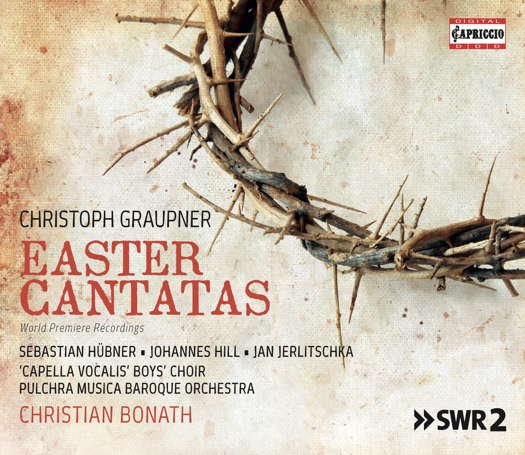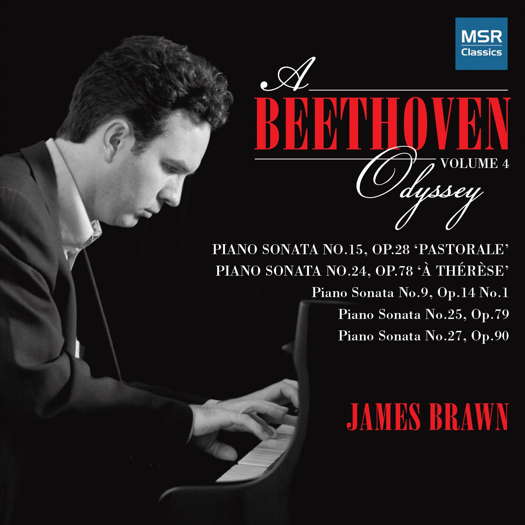- 9/11
- Vector Wellington Orchestra
- military band music
- Ward Swingle
- Thomas Jensen
- Kirchheimer
- Andreas Ludwig Priwin
- Ivo Petric

Natural Talents
GERALD FENECH listens to Easter cantatas by Baroque German composer Christoph Graupner
'Christian Bonath and his team give these baroque choral gems the ideal exposure, and reveal them to be the masterpieces they truly are in performances of inspirational nobility and incomparable beauty.'
Christoph Graupner (1683-1760) was a contemporary of J S Bach and a harpsichordist and composer of the highest level. Other contemporary composers were G P Telemann and G F Handel. This emphasizes what a highly competitive field Graupner found himself in, but his natural talents helped him command a great esteem both from his fellow musicians as well as the public. He received his first tuition from his uncle, an organist named Nicolaus Kuester. The composer went to Liepzig University where he studied law, and then completed his musical studies with the eminent Johann Kuhnau, the cantor of St Thomas Church.
In 1705 Graupner went to Hamburg to play the harpsichord in the orchestra of the Hamburg Opera, alongside Handel, then a young violinist. While in this city he composed six operas, but these stage works did not get the recognition Graupner was hoping for. In 1709 he accepted a post at the Hesse-Darmstadt court and two years later he became the court orchestra's chapel master. Graupner spent the rest of his life in the service of this court, where his responsibilities were to provide music for the court chapel. He kept composing for nearly half a century up to 1754, when he became blind. He died six years later, aged seventy-seven.
After he died, Graupner's works fell into obscurity for three main reasons:
- His manuscripts became the object of a long legal battle between his heirs and the Hesse-Darmstadt rulers. The final outcome was in favour of the latter and the heirs were unable to obtain permission to sell or publish his works, which remained inaccessible to the public.
- Subsequent dramatic changes in music styles had reduced the interest in Graupner's music and performances were hard to come by.
- Graupner had very few pupils other than Johann Friedrich Fasch to carry on his musical legacy.
His rehabilitation started in the early twentieth century, due in large part to the research efforts of many musicologists, performers and conductors. Despite all this intensive research there were relatively few recordings of his works, but in the last two decades Graupner's music has become more accessible to the public.
This Capriccio disc is a prime example of the renewed interest in the music of this very fine German baroque composer. During his long career Graupner composed some 1,400 cantatas, after his foray in the opera genre was unsuccessful. The four works under review span the liturgical period from Maundy Thursday via Good Friday and Easter Sunday to Easter Monday, and each one represents its particular festive day.
Listen — Christoph Graupner: Jesus ist mein Baum (Cantata for Holy Thursday)
(track 6, 0:00-0:37) ℗ 2021 Capriccio :
These individual cantatas were, respectively, composed in 1719, 1725, 1733 and 1743, and they provide deep insight into Graupner's stylistic development. Each one includes seven movements, usually two arias, a final chorale and four choruses and recitatives in between.
Listen — Christoph Graupner: Eröffnet euch (Cantata for Holy Friday)
(track 8, 0:01-0:59) ℗ 2021 Capriccio :
The composer sourced his texts from the writings of his brother-in-law and pastor Johann Conrad Lichtenberg, who was a prolific preacher and author of sacred literature. The music on this issue is extremely impressive, profound, emotionally moving and spiritually uplifting. Indeed, Graupner is in the league of Bach and Handel.
Listen — Christoph Graupner: Jesus Sieg (Cantata for The First Day of Easter)
(track 19, 1:10-2:10) ℗ 2021 Capriccio :
Christian Bonath and his team give these baroque choral gems the ideal exposure, and reveal them to be the masterpieces they truly are in performances of inspirational nobility and incomparable beauty. The choruses, in particular, have a certain painful sweetness that conveys all the agony and glory of this world-changing event.
Listen — Christoph Graupner: Bleibe bei uns (Cantata for The Second Day of Easter)
(track 25, 1:06-1:51) ℗ 2021 Capriccio :
Sound and presentation are first-rate. Unmissable, especially in these troubled and uncertain times.
Copyright © 4 April 2021
Gerald Fenech,
Gzira, Malta

CD INFORMATION - CHRISTOPH GRAUPNER: EASTER CANTATAS




